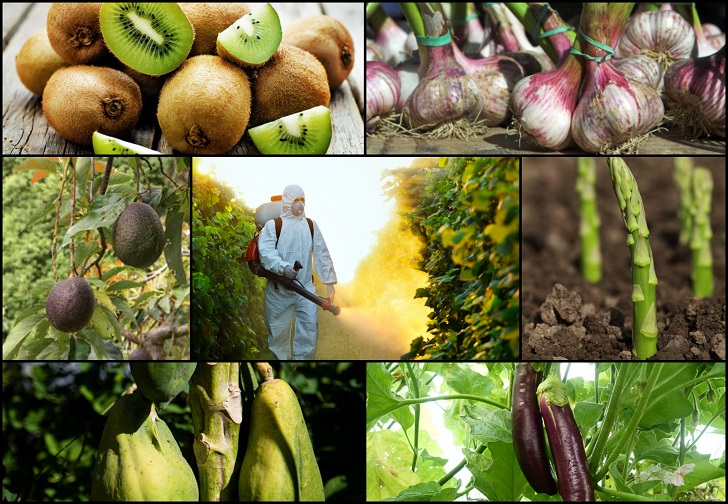
Avoiding pesticides in our food is an important step on the road to overall health. But buying organic produce can be tricky – it’s not always available and the additional cost can quickly rack up.
Even if a 100% organic lifestyle isn’t in your reach just yet, however, one thing you can do to limit your exposure to pesticides is to avoid buying the most pesticide laden fruits and vegetables, and opt for the least affected varieties.
The Research on Pesticides
You may be wondering if avoiding pesticides is really that important. Well, research proves that it is!
Swedish scientists recently found that insecticides, fungicides and plant growth regulators can build up in the bodies of children and adults. However, a mere two week break from food sources of these chemicals sees urinary levels of these toxins fall to almost zero.
Some reasons to cut down on pesticide exposure include:
Brain Health
A 2008 paper states that a number of pesticides are considered to be neurotoxins which can affect the brains of both mammals and humans. Studies have suggested a strong association between pesticide exposure and the development of Parkinson’s Disease – a chronic and progressive movement disorder.
Cancer Risk
In 2015, the International Agency for Research on Cancer (part of the World Health Organization) informed the public that glyphosate – the most widely used pesticide worldwide – is a ‘probable’ cancer-causing substance.
A 2011 report detected glyphosate in between 60% and 100% of all air and rain samples tested in the states of Iowa and Mississippi. In Europe, over 40% of Spanish groundwater samples tested positive for this chemical. And, German research found it in the urine of 44% of people tested across 18 different countries. Glyphosate has also been detected in human blood and breast milk.
Many other pesticides besides glyphosate are also considered carcinogenic.
Children’s Health
Children’s developing systems and vital organs are more susceptible to toxins than adults’. As a result, the American Academy of Pediatrics has warned that early life exposure to pesticides is associated with pediatric cancers, decreased cognitive function and behavioral problems.
Research has shown that preschool children exposed to pesticides have less stamina, worse eye-hand coordination and worse short term memory than children who haven’t been exposed to the same level of toxins.
Less Nutritious Foods
A review of 343 studies on the nutritional value of organic food in both Europe and the United States found that organic crops and organic-crop based foods provided more antioxidants, on average, than foods grown with pesticides.
Scientific American recommends that those who want to get the most nutritious fruits and vegetables should buy regularly from local organic farmers.
Most Pesticide Laden Produce
In order to reduce the risk to your health in the long run, it’s wise to avoid or choose organic when it comes to the following fruits and vegetables, which have been named the ‘Dirty Dozen’ by the Environmental Working Group (EWG) due to their high pesticide concentrations:
- Strawberries
- Apples
- Nectarines
- Peaches
- Celery
- Grapes
- Cherries
- Spinach
- Tomatoes
- Sweet Bell Peppers
- Cherry Tomatoes
- Cucumbers
According to the EWG, over 98% of strawberry samples, peaches, nectarines, and apples tested positive for at least one pesticide residue; while single samples of strawberries showed 17 different pesticides and grapes and sweet bell pepper samples contained 15!
Although it didn’t make the Dirty Dozen list for 2016, the average potato had more pesticides by weight than any other produce.
The EWG also highlights two types of food that contain trace levels of highly hazardous pesticides. These are leafy greens (like kale and collard greens) and hot peppers. While they don’t meet traditional Dirty Dozen ranking criteria, they were frequently found to be contaminated with insecticides toxic to the human nervous system.
Least Pesticide Laden Produce
In addition to the annual ‘Dirty Dozen’ list, the EWG published their ‘Clean Fifteen’ list for 2016 which ranks the fruits and vegetables that have the lowest levels of pesticides on them. This means that buying conventional (non-organic) versions of these foods is relatively safe in terms of pesticide intake.
The ‘cleanest’ produce for 2016 are:
- Avocados
- Sweet Corn (*check for varieties that haven’t been Genetically Modified)
- Pineapples
- Cabbage
- Frozen Sweet Peas
- Onions
- Asparagus
- Mangoes
- Papayas (*check for varieties that haven’t been Genetically Modified)
- Kiwis
- Eggplant
- Honeydew Melon
- Grapefruit
- Cantaloupe
- Cauliflower
As we know, avocados are an incredibly healthy fruit and now we have yet another reason to eat them – they’re the cleanest food on the list with only 1% of avocado samples tested showing any detectable pesticides!
In addition, 89% of pineapples, 81% of papayas, 78% of mangoes, 73% of kiwi fruits and 62% of cantaloupes had no residues.
While 5.5% of Clean Fifteen samples had two or more pesticides, no single sample tested positive for more than four types of chemicals meaning you can rest easy while dining on your healthy fruit salad from this list!
Washing Pesticides Off Produce
Regardless of what fruits and veggies you purchase, it’s always a good idea to wash them thoroughly to remove any trace chemicals or bacteria which may be on the outer layers. Here are 5 Natural Ways to Wash your Fruits and Vegetables.
